
Doctors in Tennessee are putting patients on fewer addictive painkillers. An annual survey finds that opioid prescriptions dropped 8.9 percent in Tennessee last year, but the state still stands out for its high rate of prescribing.
The state’s drop in opioid prescribing exactly mirrors nationwide figures — which are the largest one-year decline, according to clinical research firm IQVIA.
Numbers have been headed down since 2011 as doctors become more educated on the dangers of opioids. Insurers put new restrictions on what they’ll pay for. And some states have made it difficult to prescribe more than a week’s worth of pills. Tennessee will likely follow suit this year, restricting most initial prescriptions to just a three-day supply.
Some states that have already cracked down have experienced more dramatic falls (download state-by-state chart). West Virginia, Pennsylvania and Ohio had double-digit declines last year. Tennessee is still one of five states — all in the South — where there are more opioid prescriptions than there are people in the state, meaning many adults must be taking multiple narcotics on a regular basis.
The Tennessee Medical Association, which is the largest trade group for doctors in the state, says that the 2017 data validates “ongoing efforts to self-regulate” opioid dosage. The TMA has pushed back on efforts to restrict prescribing, though the organization is now comfortable with the current proposal.
“This report shows that Tennessee’s medical community is driving real change in the initial supply of opioids in our state,” TMA president Nita Shumaker said in a statement. “Once we recognized the addictive dangers of these medications we worked hard to change the culture and improve supervision.”


